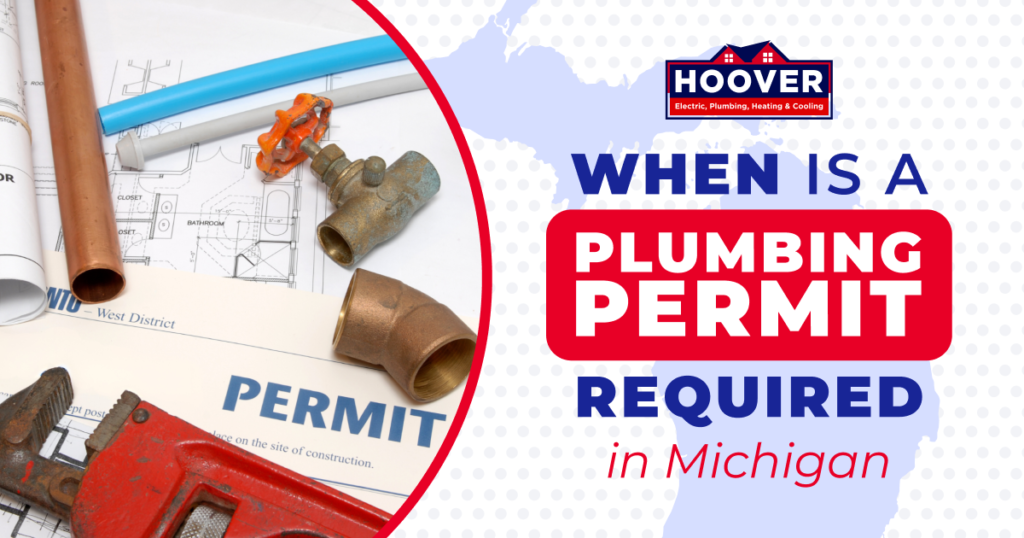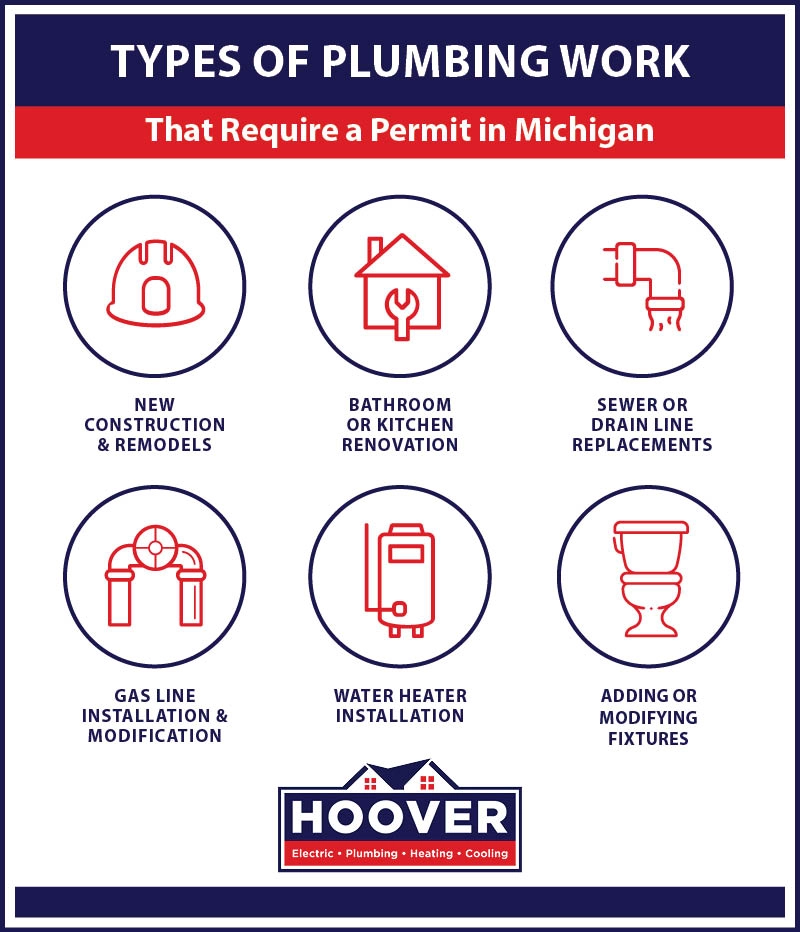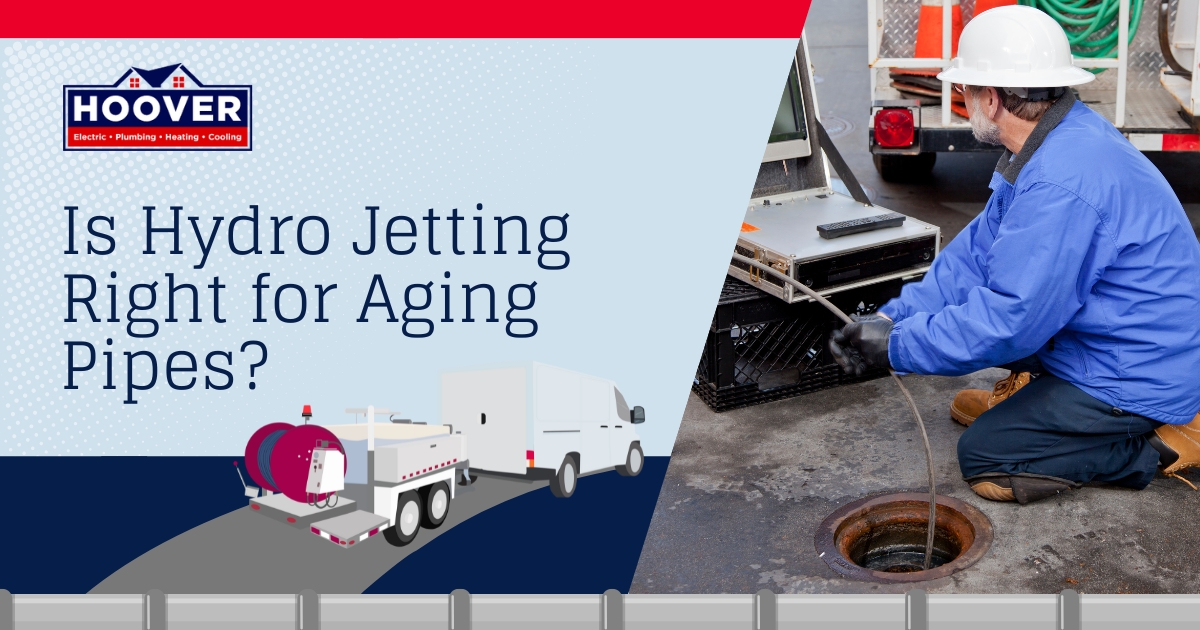
Whether you’re updating your kitchen or replacing part of your sewage system, plumbing permits help ensure the safety and reliability of your plumbing system. Hoover Electric, Plumbing, Heating, and Air can assist with plumbing permits in Michigan and any installation, repair, or maintenance needs for your home.
Why Do I Need a Plumbing Permit in Michigan?
Plumbing codes are legal regulations that ensure the proper installation of plumbing systems and equipment. As per standards in the Michigan Plumbing Code, Michigan Licensing and Regulatory Affairs awards licenses and permits to eligible applicants.
Permits help ensure that plumbing services comply with local building codes and safety standards, reducing the risk of negligence or errors that could lead to mold, water damage, and other hazards. Approved plumbing improvements that adhere to local plumbing codes can also protect your home’s property value and provide you with peace of mind.
What Plumbing Work Requires a Permit in Michigan?
Permits can apply to many types of plumbing work that seem straightforward but actually make significant changes to your home’s systems. These types of plumbing work typically involve new infrastructure, whether as a new installation, remodel, or replacement.
Broken down into several categories, plumbing work requiring a permit in Michigan generally includes:
- New construction and remodels: New buildings, additions to existing buildings, or renovations generally require plumbing permits.
- Bathroom and kitchen renovation: A bathroom or kitchen renovation that modifies the connection to municipal water and sewer systems is subject to permits to protect against water contamination or infrastructure damage.
- Sewer and drain lines: In the same sense, major plumbing repairs, replacements, or modifications to sewer and drain lines require permits to maintain the safety of the municipal system. This may include pipe replacements, sump pumps, backflow preventers, and other equipment.
- Gas lines: Gas line installation and modification generally requires a state or municipal plumbing permit.
- Water heaters: Involving potential plumbing, electrical, and gas work, water heater installation and replacement is generally a major job that requires a permit.
- Adding or modifying fixtures: Adding new sinks, showers, toilets, or other plumbing fixtures or changing the location of fixtures can impact the plumbing system’s water supply, venting, draining, and other functions.
Exceptions to the Plumbing Permit Requirement in Michigan
Many small plumbing repairs or maintenance tasks don’t require a permit, but it’s best to speak to a licensed plumber to ensure compliance with Michigan Plumbing Code requirements.
Plumbing permits aren’t required for minor repairs and maintenance, including:
- Leak repair
- Faucet repair
- Clog or obstruction removal
- Drain cleaning
- Filter replacements
Some emergency circumstances mean plumbers must urgently replace or repair plumbing equipment that ordinarily requires a permit. In these cases, the permit application should be submitted the following business day.
DIY Plumbing in Michigan: What You Can and Can’t Do
Many Michigan homeowners try to save costs by personally taking on plumbing projects, but it’s important to know what you can and can’t do to protect your home.
What you can do
Small repairs and routine maintenance often don’t require permits, and these tasks can be simple for homeowners with basic plumbing understanding. You can resolve minor leaks, for instance, by patching the area with silicone tape, epoxy putty, or a rubber sleeve until you can have it professionally repaired. Likewise, these everyday maintenance tasks can help keep your system running smoothly:
- Use baking soda and vinegar to clear slow drains
- Clear clogs with plungers or drain snakes
- Inspect your system periodically for leaks or other signs of damage
- Clean drain traps and screens
- Insulate pipes with foam insulation
- Drain and flush your water heater annually
- Schedule professional plumbing inspections and maintenance
Michigan allows homeowners to complete minor repairs without a plumbing license. You may also complete certain installations if you secure homeowner plumbing permits and inspections from the appropriate agencies.
What you can’t do
While DIY plumbing repairs and maintenance can be cost-effective, leaving advanced tasks to professionals is best for plumbing code compliance. Many permits require a licensed plumber to perform the work for major installations and remodels to ensure safety during the project and after its completion.
How to Obtain a Plumbing Permit in Michigan
Follow these steps to obtain a plumbing permit in Michigan:
- Check requirements: Check with your plumber and municipality to confirm whether your project requires a permit.
- Prepare application: Download and complete a plumbing permit application.
- Organize documents: Gather documents and materials as needed, such as contractor information, project plans, and applicable fees.
- Submit application: Submit your application online, by mail, or in person.
- Inspection and approval: If your authorizing agency approves your permit, they may require inspections to ensure compliance.
What Happens If I Don’t Get a Permit?
Plumbing code regulations provide protections to you and other Michigan homeowners. Failing to obtain a permit can lead to several consequences, namely safety hazards such as water leaks, sewage problems, mold growth, and more.
Homeowners can also face fines or penalties for not having the necessary permits. Municipalities may require you to undo or redo your unpermitted plumbing work to bring it into compliance, subjecting you to additional time and costs.
Furthermore, work completed without the appropriate permits can decrease the value of your home as it becomes a risk factor. This can also leave you subject to unpaid property taxes later on if your unpermitted work is actually compliant and improves the value of your home. Lastly, working without a permit can leave you vulnerable to legal and financial issues when filing an insurance claim or selling your home.
Trust Hoover for Licensed and Permit-Compliant Plumbing Projects in Michigan
Hoover Electric, Plumbing, Heating, and Cooling is the trusted provider across Clinton Township, Ann Arbor, and other Michigan areas. In addition to expert services from our licensed plumbing team, our customers also take advantage of flexible financing, free estimates, and more. Contact us today or book online for your plumbing service.
Frequently Asked Questions
How much do plumbing permits in Michigan cost?
Plumbing permit costs vary depending on the scope of your project — Michigan applications generally calculate permit costs by fixture and other factors.
How long does it take to get a plumbing permit in Michigan?
The time required to get a plumbing permit can range from a few days to several weeks. Online applications may reduce delays in processing.



